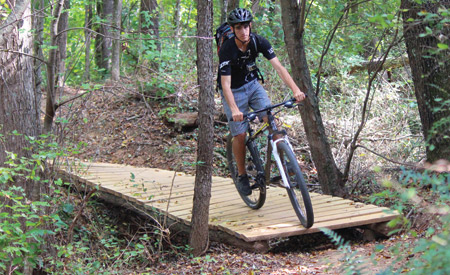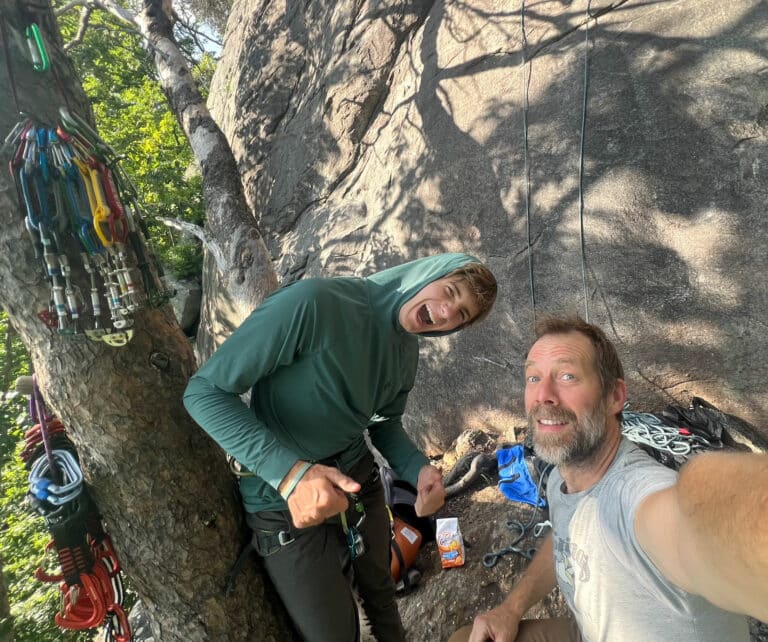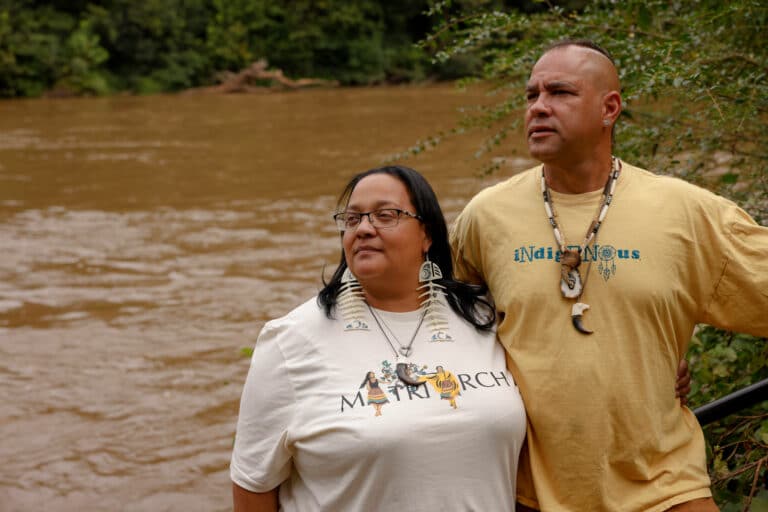Just across the bridge from downtown Asheville, there’s a sick, flowy trail that weaves around a manicured golf course before ducking in and out of the woods and popping out below a hotel.
Ride the whole trail and you’ll hit berms, jumps, singletrack, drops—an unparalleled diversity of terrain, and you’ll do it all in the shadow of downtown Asheville. This is KOLO, a brand new bike park with four miles of flow trail traversing 100 acres of rolling terrain in a relatively urban setting.
“This is the type of trail you can’t typically find in the woods,” says Eric Krause, founder and owner of KOLO. “These flow trails are part of the bigger lift-served bike parks out west. We don’t have a chair lift, but we have the rolling terrain, and we’re packing a lot of stuff into the 100 acres of land all around this property.”
The trail is already loaded with skills park elements. There’s also an Adventure Center where riders can hang out, change, and use the restroom. This spring, the trail system will grow with new singletrack through surprisingly rocky terrain, a pump track, and some wooden elements that are popular out West.
As it develops, KOLO has the potential to offer a style of riding seldom found in the South, but the model also has its challenges. Its location is both a benefit and a detractor. While KOLO is instantly accessible for bikers in Asheville, you’re not getting a wilderness experience at this park that navigates a golf course and hotel. And then there’s the fact that KOLO isn’t free. Full-day access to the park will run you $19. The price tag begs the question: why pay money to ride your bike?
“What we have is different,” Krause explains. “There’s plenty of free riding out there, and it’s all great. But this is a different experience. The trails are geared toward honing your skills. If you want to work on jumps or balance riding, you can do that here. You can do the riding that you can’t do out in the woods.”
Krause is also positioning KOLO to be a destination for races and clinics, lining up Super D and short track series as well as ongoing adult and youth clinics. Unlike forest service singletrack (most of which was built with hiking in mind), flow trails are ideal for this sort of multidimensional approach to both racing and learning. The trails are designed to be approachable for beginners and fun for experts, with the difficulty level dependent on the speed of the biker.
As for the urban location, we’re starting to see this sort of in-fill bike park development across the region. In Travelers Rest, outside of Greenville, S.C., Gateway Park has an expanding portfolio of flow and skills trails, along with dirt jumps, wooden features, and a pump track. Knoxville’s Urban Wilderness is a growing network of trails that weave through parks and private land around downtown Knoxville. You have to connect certain sections of the trail network with roads, but there are 35 miles of trails to explore. Stringer’s Ridge, in Chattanooga, offers a stacked loop system with eight miles of trail on the edge of downtown. Richmond has had downtown singletrack galore for years thanks to the James Island Park system, and the relatively new Rockburn Skills Park, just north of Columbia, Maryland, has a pump track, skills park, and downhill lines.
All of these trails allow bikers to get a quick in-town fix, but Krause believes KOLO can be more than just a quick hit for mountain bikers too time-strapped to venture into the national forest.
“KOLO offers a taste for all styles of riding,” Krause says. “This spring, we’re also planning on adding some wooden elements and building trails that take advantage of a rocky section of the property. This is the kind of stuff you just can’t find in Pisgah.” •








